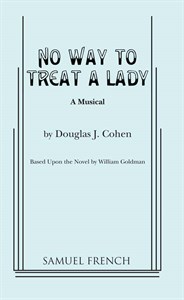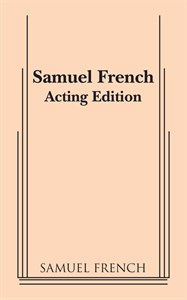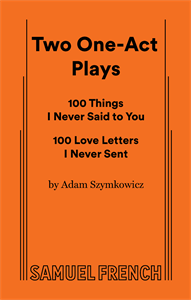
No Way to Treat a Lady
- Full Length Musical, Dramatic Comedy, 1970s
- 2M, 2F
- ISBN: 9780573626333
"TERRIFIC! HILARIOUS! DYNAMIC! An unabashedly histrionic romp with plenty of laughs, a fair share of romance and a welcome abundance of drollery."
The Los Angeles Times
"Catchy tunes and snappy lyrics... Mr. Cohen's score is a reassuring fusion, a mastery of traditional musical comedy style adoring and informing an offbeat story. A beguiling musical!"
The New York Times
Description
- Full Length Musical
- Dramatic Comedy
- 120 minutes
- Time Period: 1970s
- Target Audience: Teen (Age 14 - 18), Senior, Adult
- Set Requirements: Unit Set/Multiple Settings
- Cautions: Gun Shots, Mild Adult Themes
- Orchestra Size: Small/Combo
- Performance Group:
- Large Stage, Dinner Theatre, Community Theatre, Professional Theatre, Outdoor, Shoestring Budget, Reader's Theatre, Blackbox / Second Stage /Fringe Groups, College Theatre / Student
Douglas J. Cohen is the recipient of the Fred Ebb Award for Musical Theatre Songwriting, two Richard Rodgers Awards, a Jonathan Larson Grant, the Gilman & Gonzalez-Falla Theatre Foundation Award, and the inaugural Noël Coward Prize.
REVIEWS:
"Terrific! Hilarious! Dynamic! An unabashedly histrionic romp with plenty of laughs, a fair share of romance and a welcome abundance of drollery."
The Los Angeles Times
"The best news about this 1987 Off-Broadway vehicle, which incorporates an oddball premise for musical into a surprisingly conventional framework, was the arrival of a major musical-theatre tunesmith. Cohen's delightful songs (love ballads, soft-shoe ditties, jazz, and more), boasting smart lyrics and lilting melodies, display a hand adept at revealing character nuances and advancing the story. Four triple-threat performers maximize the pleasures here...fresh and vibrant offering is a splendid way to treat an audience."
Backstage
CRITIC'S PICK! "5 out of 5 stars! A divinely fresh entertainment."
StageHappenings.com
"A fine way to treat a musical! A real winner."
The New York Post
"Catchy tunes and snappy lyrics... Mr. Cohen's score is a reassuring fusion, a mastery of traditional musical comedy style adorning and informing an offbeat story. A beguiling musical."
The New York Times
"A lighthearted romp."
Associated Press
"A fine and dandy way to treat an audience... It should be on Broadway."
The New York Observer
No Way to Treat a Lady premiered off-Broadway in a sold-out, extended run at the Hudson Guild Theatre in 1987 directed by Ton Award winner Jack Hofsiss and starring Stephen Bogardus, Liz Callaway, Peter Slutsker and June Gable.
It received an off-Broadway revival in 1996-97 at the York Theatre Company by Scott Schwartz and starring Adam Grupper, Paul Schoeffler, Alex Korey, and Marguerite MacIntyre. It was nominated for two Outer Critics Circle Awards (Best Revival and Best Featured Actress) as well as a Drama Desk Award.
Characters
- Casting: 2M, 2F
- Casting Attributes: Strong Role for Leading Woman (Star Vehicle), Strong Role for Leading Man (Star Vehicle), Expandable casting
- Casting Notes: The actor playing Kit Gill disguises himself as seven other characters within the course of the play: an Irish priest, an Arthur Murray dance class instructor, a French waiter, a telephone repairman, a pizza delivery messenger, a New York cop, and a female barfly. The actress playing the character woman portray five different women: Det. Morris Brummell's Jewish mother; Kit Gill's legendary actress-mother, Alexandra Gill; an Irish widow; an Italian former Queen of the Roseland Ballroom; and a lonley barfly. In both productions in England, the part was split between two actresses, although it is strongly preferred that one actress play all five roles.
- Chorus Size: No Chorus
Available Material
| Name | Price |
|---|---|
|
Perusal Material
Shipped immediately. This is optional.
Order Now
1 x Libretto |
$24.00 |
|
Libretto - No Way to Treat a Lady
This is optional.
Order Now
The Libretto is available for SALE ONLY and is not available for hire as part of the Rehearsal Set. |
$24.95 |
|
Rehearsal Material
Shipped a minimum of 3 months before the last performance. This must be hired as a condition of the License to produce this show.
5 x Piano/Vocal Scores |
$100.00 +$25.00/pm |
|
Orchestral Material
Shipped a minimum of 1 month before the last performance. This is optional.
Reed I |
$50.00 +$25.00/pm |




